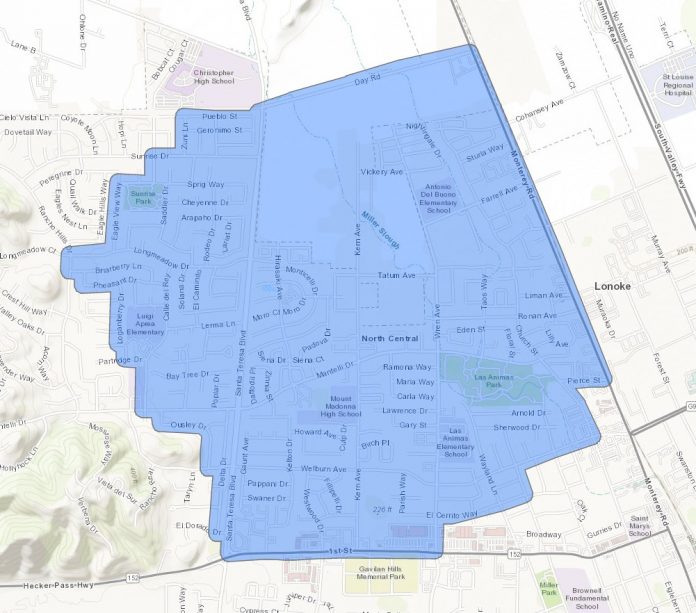
County officials confirmed West Nile virus in mosquitoes found in parts of Gilroy.
The positive tests were found in adult mosquitoes collected from portions of the 95020 ZIP code area that includes part of Gilroy, according to the County of Santa Clara Vector Control District.
As a result, a truck-mounted adult mosquito control treatment has been scheduled in the area to prevent human cases of WNV. Weather permitting, the ground operations are scheduled for approximately 10pm on Aug. 26, and will conclude a few hours later.
The district is adhering to all recommendations from the Centers for Diseases Control and the County of Santa Clara Public Health Department regarding Covid-19 and will be conducting the treatment in accordance with those guidelines.
Door hangers notifying the public of the scheduled mosquito treatment will be placed in neighborhoods beginning Aug. 24. Notice is also being sent directly to the public in the treatment ZIP codes through AlertSCC, and to those who subscribe to Nextdoor neighborhood networks.
Vector Control staff will be available to answer any questions from the public, Monday – Friday, at 408.282.3114, from 7:30am to 4:30pm. Questions can also be submitted by email to ve********@********ov.org.
The treatment will be centered at Kern and St Claire avenues and bordered by:
• North – Longmeadow Drive, Jicarilla Place, Sunrise Drive, Pueblo Street and Day Road.
• East – Monterey Road, Church Street, Carmel Street, and Wren Avenue.
• South – Welburn Avenue, El Cerrito Way, First Street, Partridge Drive, Ousley Drive, and Pleasant Drive.
• West – Santa Teresa Boulevard, Delta Drive, Osley Drive, Calle de Rey, Loganberry Drive, Thistle Way, Rancho Hills Drive, Eagle View Way, Cooper Place and Zuni Lane.
During the adult mosquito control treatment operations, there is no need to relocate, officials said. Those who wish to minimize exposure for family members or pets may close windows and remain inside during the scheduled time period, which typically lasts three hours.
WNV infection does not cause symptoms in most people; however, for some individuals it can cause fever, headache, body aches and, in severe cases, significant neurological damage or death. Adults older than 50 years and individuals with certain chronic medical conditions such as diabetes, high blood pressure, cancer and kidney disease are most at risk for serious complications.
The public can play a role in preventing the spread of West Nile virus, officials advised. The following are some prevention measures.
On your property:
• Drain or dump standing water weekly. Mosquitoes lay eggs in stagnant water.
• Drain, remove or turn over anything that can hold water, such as flowerpots, planter bases, bird baths, toys, cans, rain gutters, pet dishes, buckets and old tires. Fix leaky water faucets and sprinklers.
• Screens on doors and windows should be tight-fitting and in good condition.
• Do not let your swimming pool water fall below the pump circulation area. Free mosquitofish placement can be requested online at www.sccvector.org for placement in neglected pools or ornamental ponds.
• Limit outdoor activities during dusk and dawn to prevent mosquito bites. Those are the times when the mosquitoes that transmit WNV are most active.
• If you need to go outside in an area where mosquitoes are active, dress in long-sleeved shirts and long pants, preferably in light colors, and apply insect repellent approved by the Environmental Protection Agency, following label instructions.For free assistance with mosquito control, WNV, or other vectors, residents can contact the District office at 408.918.4770 or fill out a service request online at SCCVector.org.












